It’s just a field—unwatered but mowed—running ragged into September through August’s scorch. The field mocks the green, manicured lawns bordering it that have been tended by migrant workers on hands and knees who claw weeds with trowels in the beach houses’ pea gravel driveways.
It’s just a field, tended by the dead. The corpses in the field rake the dirt from beneath with their rib bone trowels. The corpses’ blood, gut-pus, urine, and feces have done all a dead body can be expected to fertilize the field, but bodily liquids have long since run dry. From top down, the field is just a neglected field in the middle of Nantucket Island, hemmed by a weathered split rail fence and marked by a simple black and white sign: The Quaker Burial Ground.
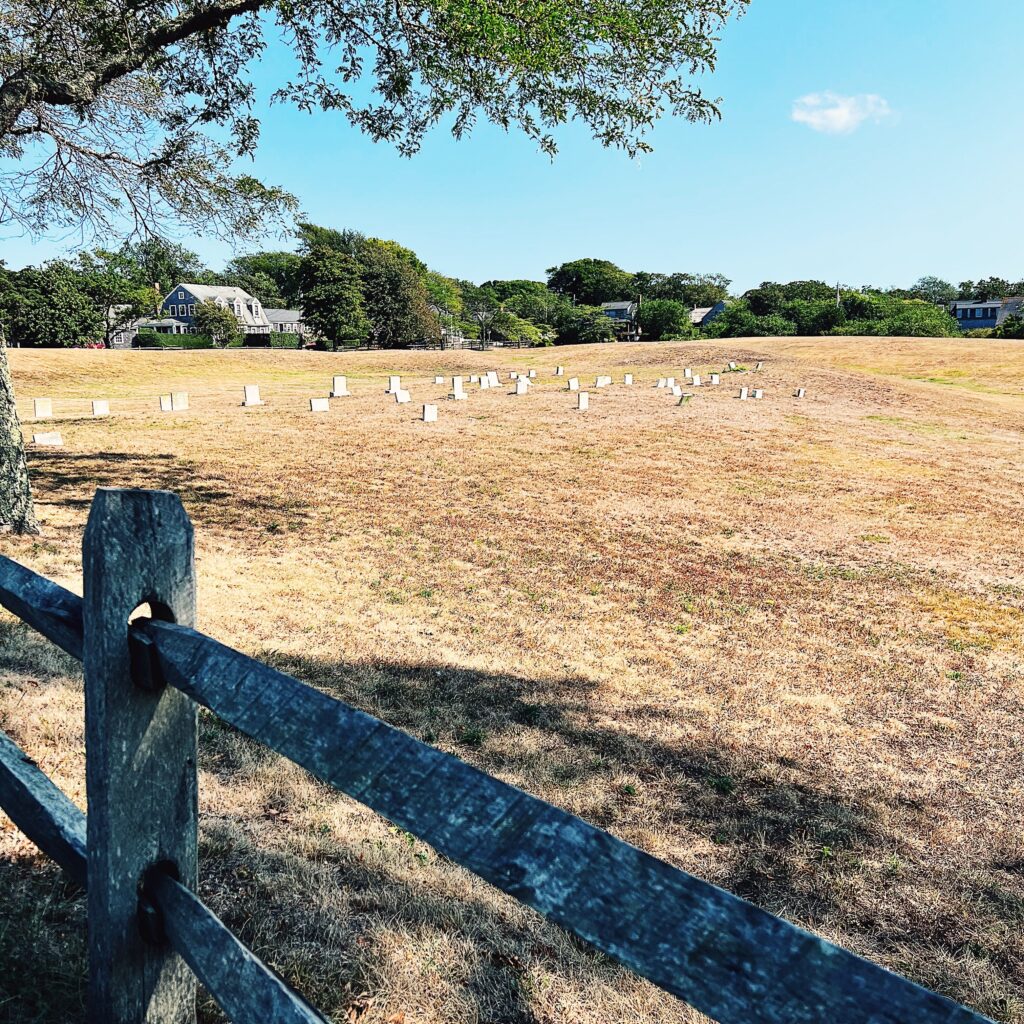
A few white stone markers cling to the field like stubborn molars in an exhumed jaw. The sign explains the lack of other headstones—the Quakers believed gravestones encouraged idolatry and so buried their dead in this field with no commemoration. It’s a field of children, mothers, fathers, grandmothers, grandfathers, and all the great-grands beyond them. All that human vanity, generosity, selfishness, joy, curiosity, humor, anger, and the things that mark a life are buried in unmarked but consecrated ground. Birth and death dates and names are held secret by a past that could be yesterday or some date far more Jurassic; who can tell with no idolatrous gravestone to tempt a passerby with more information? On today’s date, there remains only invisible corset stays of bones to uphold the stubbled field’s surface.
One morning, I see two living people in the field. One holds a kite string. One releases the kite. The man runs backward, and the string pulls the kite along, but the kite judders and jumps against the baked earth. No puff of air soars the kite skyward because all the lungs in this field hold their breaths, unable ever again to inhale-exhale a puff that circulates up to the land of the living.
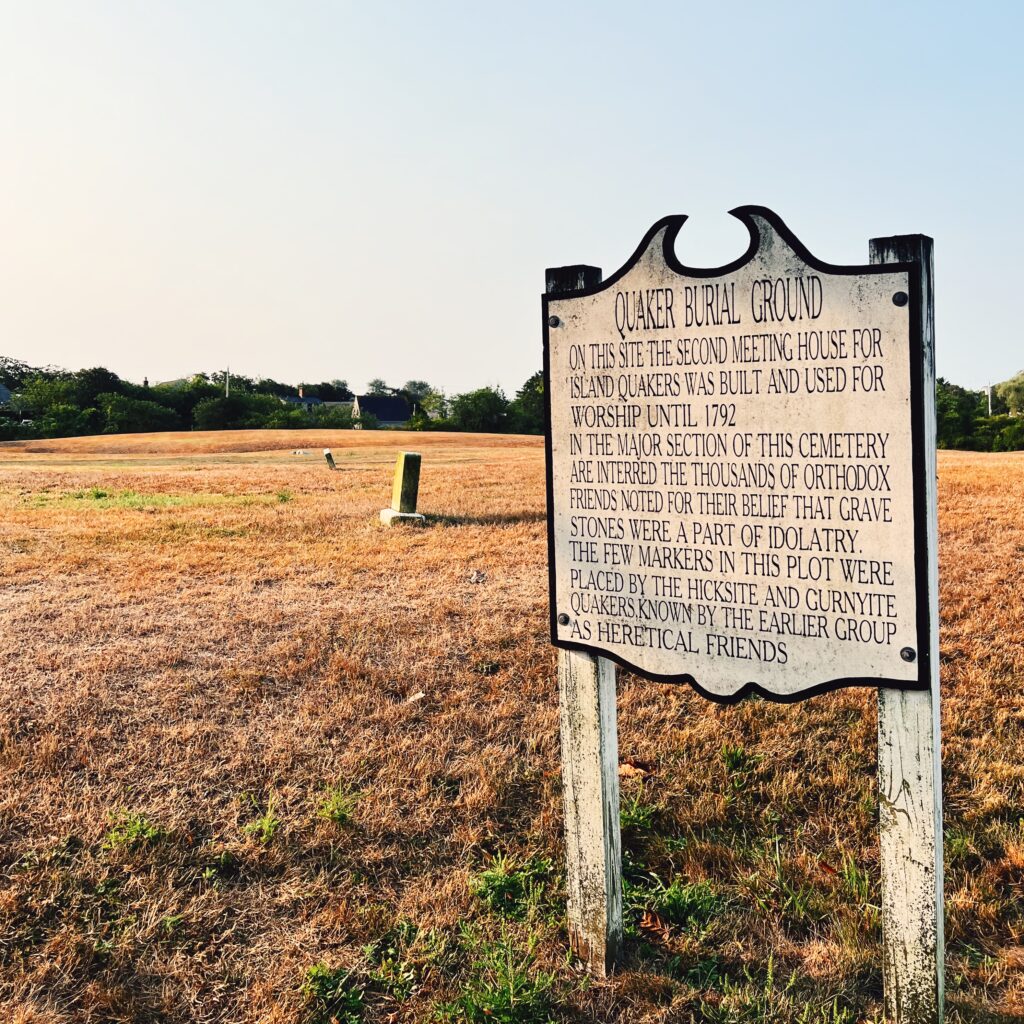
It’s just a field, and it’s just a kite, and there have been many other kites and fields I’ve seen and forgotten, but the human movement draws attention. Jeep Wranglers pass and faces glance twice at the just-a-field, curious about the few white stones in the expanse that could be developed into another neighborhood of grey shingled homes sold for millions, adding up to billions, of dollars. What verdant lawns could be coaxed to reinvigorate this dead field. The people—tanned arms resting on open windows, Phillipe Patek watches, Ray Ban sunglasses, navy and white striped sweaters, skins sacks of vanity, generosity, selfishness, joy, curiosity, humor and anger—people flash by the sign explaining the Quaker burial ways. “Not for sale,” the sign suggests. This wasteland of space is already occupied by an unseen neighborhood.
If Nantucket Island takes care to sign, proclaim and name an empty field, imagine the signs labeling the abodes of the living. Houses display brass plaques with family names of comical antiquity (Starbucks, Coffin, Swain, Greenleaf, Pile) and dates rooted in Colonial America. Signs note the longer-ago history of the Wampanoag tribe whose dead rested in fields over the island long before the Quakers claimed space with their invisible ink.
Living people, unlikely to wear plaques or gravestones yet, label themselves with Nantucket. “Nantucket” is emblazoned in white letters across the breathing chests in t-shirts, long sleeve shirts, sweatshirts, hats, socks, dog leashes. Tan, teal, mint green, navy blue, slate blue, grey blue. As September makes a run for October, the stores make a grab for the season’s last tourists’ money: 30% off. Buy one Nantucket sweatshirt, get a second free.
It’s just a field, but its silent censure gets to me. I don’t buy the Nantucket sweatshirt I want to because I imagine some stern Quaker glare at such a display of idolatry. I tuck the island into my heart where fellow tourists and dead Quakers won’t know I’m worshipping it.
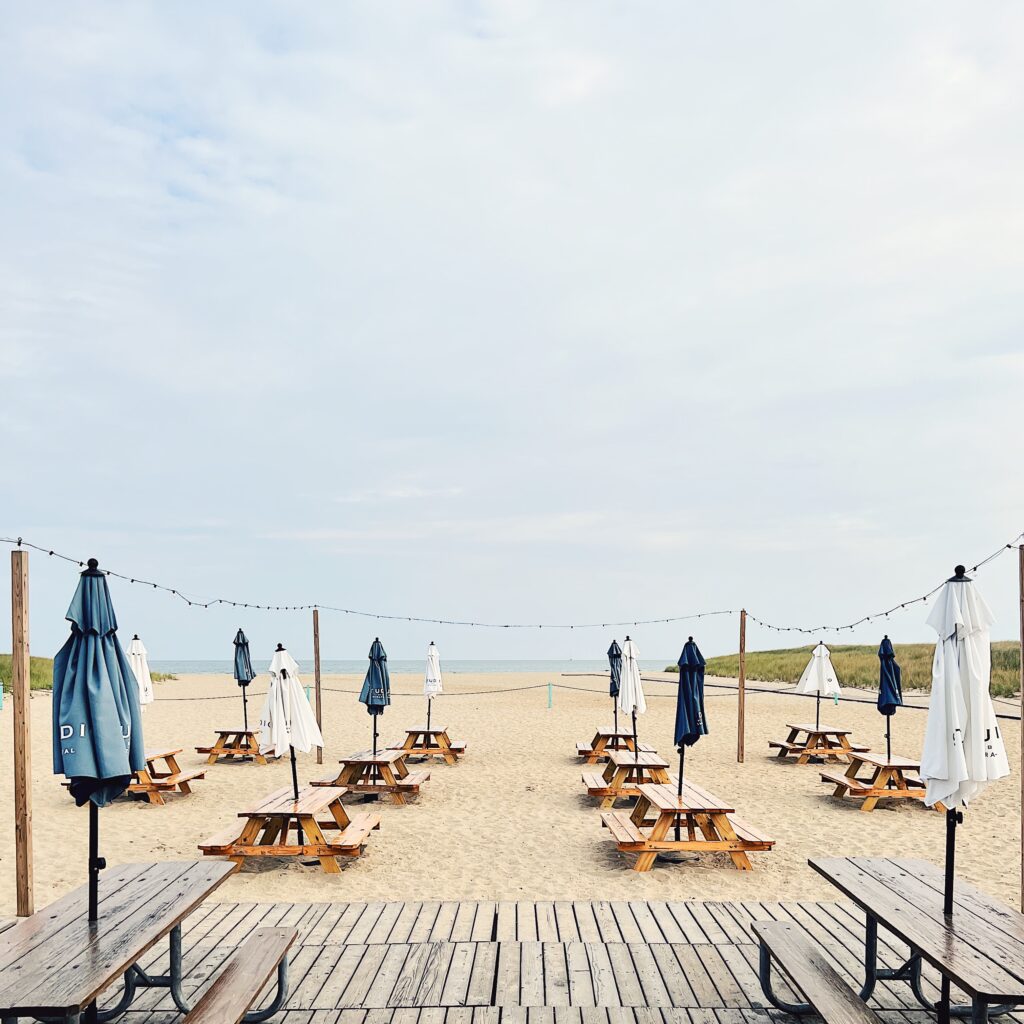
I take a morning run from our rental house by the Quaker graveyard to Jetties beach. That early, The Sandbar beach restaurant is closed, but even with picnic table umbrellas rolled down and plank floorboards wiped clean, the ghosts of last night’s oyster and beer revelers drift in hungover wisps. A path leads to a swing set, a bench, a bobbing whale toy. I launch skyward on a swing. At my highest crest, I see a strip of grey ocean and Brant Point Lighthouse. Another swoop and I see rows of shingled houses behind blue hydrangea hedges. On the bench by the swingset, someone has lined slipper shells. The oval shells are white, palest pink, and tan. I could pop them onto my ten fingertips and tap dance them, but I leave without disturbing the row.
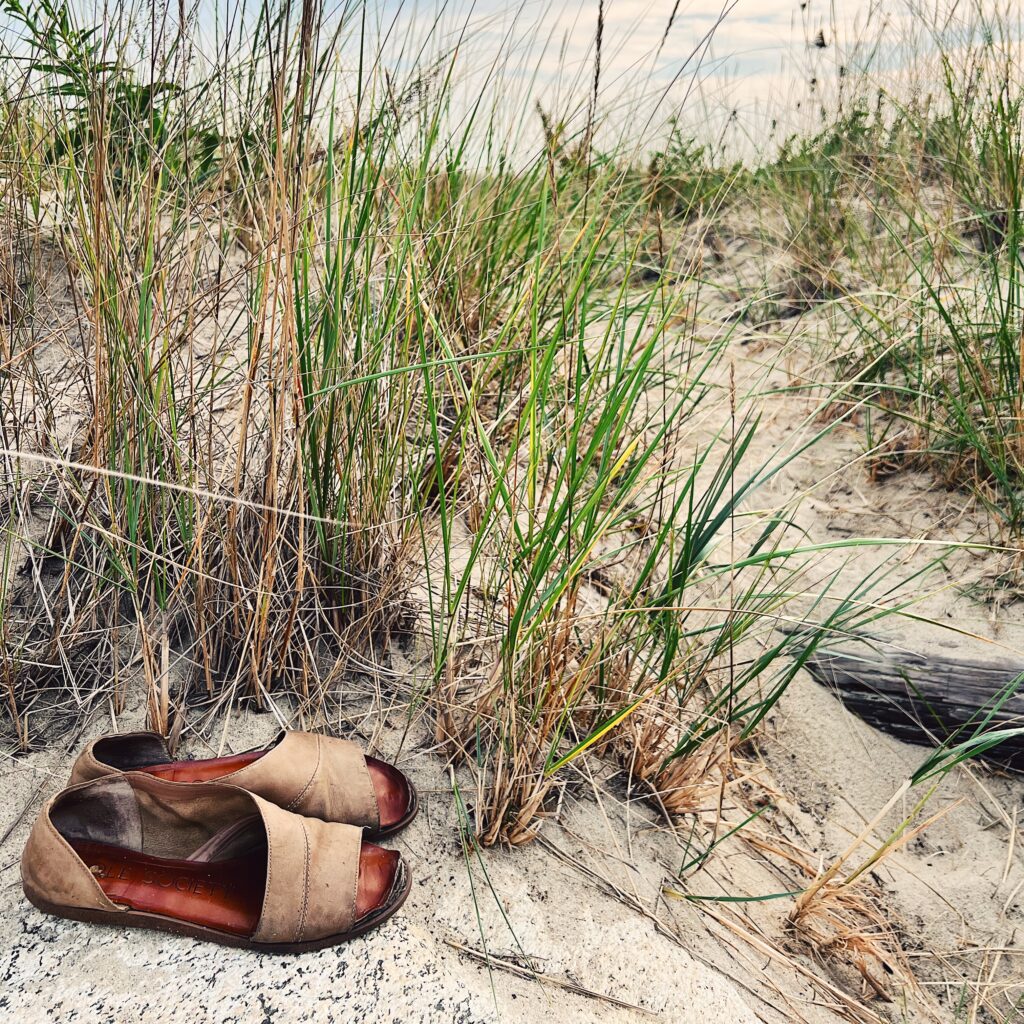
I pass a pair of leather shoes discarded next to the beach parking lot. Discarded? They seem carefully forgotten, lined up as neatly as the shells. The shoes are worn—toes curled and leather cracked—and look treasured as though the owner wanted the shoes to hope for an afterlife, maybe with a dog who prefers to play with an old shoe over a tennis ball. The brand name has worn off the footbed of these sandals, but they, like everything on Nantucket Island, are branded by wealth or the ghost of it.
I spend four days on Nantucket Island, but I do not buy a sweatshirt. I buy a cast iron whale hook. I buy a scrimshaw Christmas ornament that says Nantucket. I buy a Thanksgiving-inspired sandwich called the “Turkey Terrific” from Provisions cafe and consume it in huge bites next to the harbor where yachts loom and tuna fish fins dry tacked to the shingled sides of fishing shacks. My mouth is smeared by cranberry sauce, mayonnaise, stuffing, and flakes of roast turkey. I give thanks for Nantucket where I am a living, breathing, unrepentant idol worshipper.

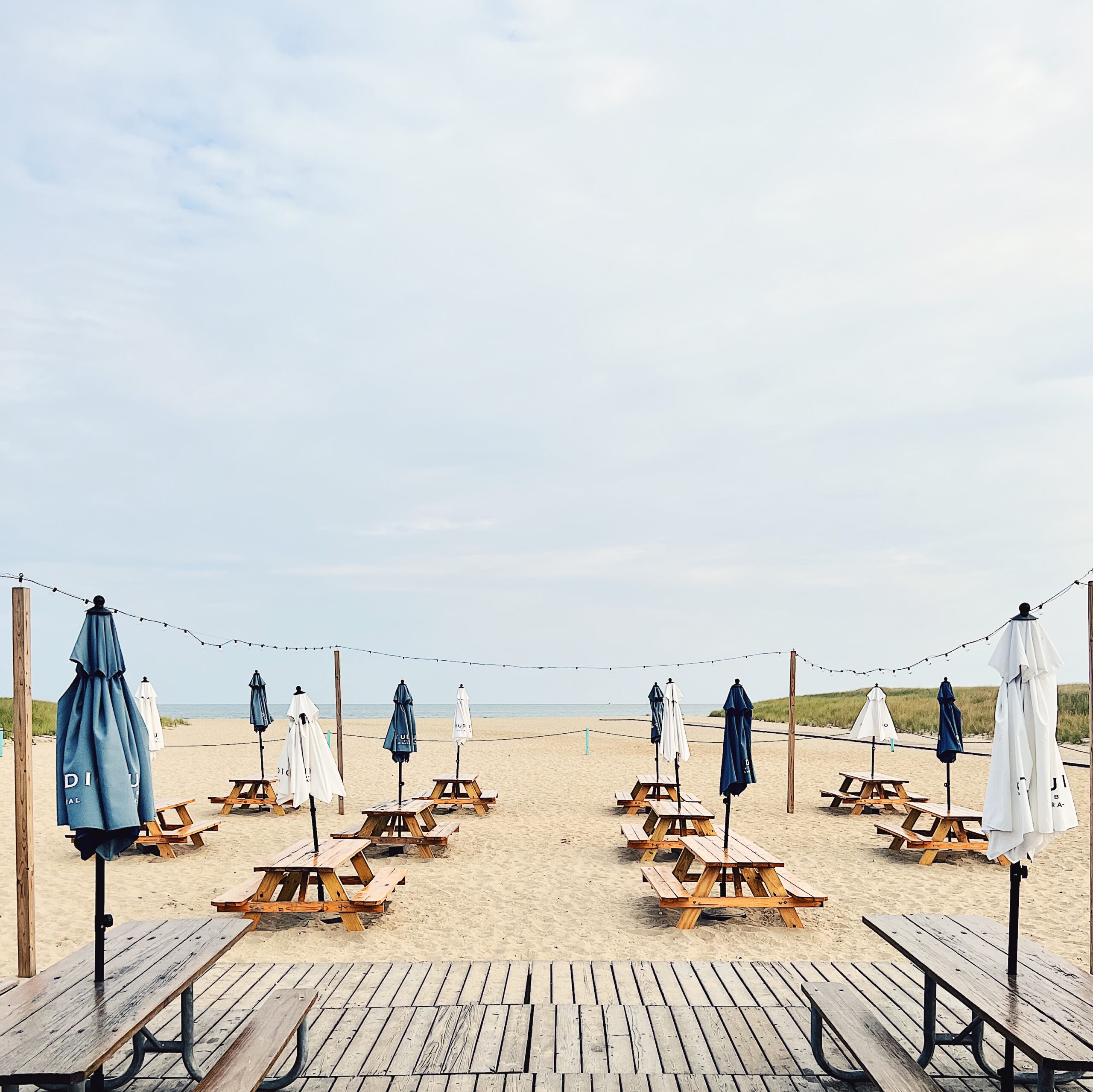
Beautiful written memorial to thousands of Wampanoags and Quakers who lie in peace. What touches and moves me is the fellowship these two peoples lived in within their own groups. Perhaps that is the greatest gift they silently represent. Fellowship..A precious gift that seems to me is very hard to fine these days. But our pseudo attempts to create it testify to how deep, this need for TRUE fellowship, lies in our souls.Ever present. Ever searching.